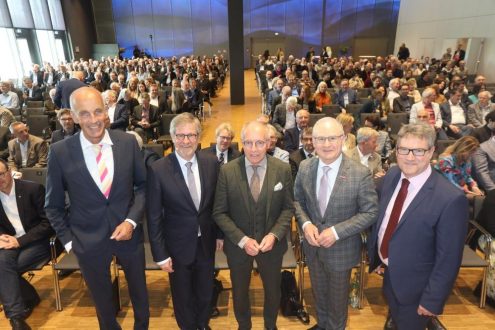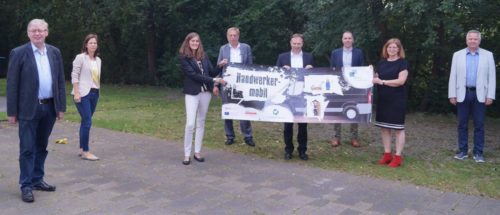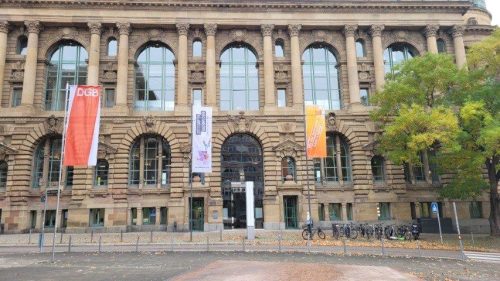TÜV SÜD becomes the world’s first Notified Body for the new Machinery Regulation
The role of TÜV SÜD
As a Notified Body, TÜV SÜD plays a key role in the implementation of the Machinery Regulation. The testing, inspection and certification (TIC) company offers comprehensive support for manufacturers and other economic operators with respect to implementation of the Regulation and to product testing and certification. This applies particularly to new technologies such as machine learning approaches (e.g., using artificial intelligence) and cybersecurity. With a global network of professionals and extensive specialized expertise, TÜV SÜD supports manufacturers seeking to obtain conformity assessment of their machinery products to verify the products’ compliance with the strict requirements of the Regulation. Customers of the TIC company benefit from its wealth of interdisciplinary knowledge in the fields of safety of machinery, risk assessment, cybersecurity, and CE marking.
Drawing on its extensive experience in working with machinery manufacturers, TÜV SÜD offers a host of services related to the Machinery Regulation, including testing and certification as well as training courses on the requirements of the Regulation. This support enables companies to maintain the highest safety standards while they seamlessly align their products to the revised requirements, concluding with certification as the prerequisite for placing their products on the market.
The new Machinery Regulation represents a key step in building a safe, secure, and future-facing industry. It offers extremely high levels of protection for users and the environment, and also helps to maintain Europe’s leading position amid global competition over digital transformation. By addressing artificial intelligence and cybersecurity, the Regulation establishes the necessary framework for integrating safety and security into innovative design and boosting trust in modern machinery. “As a Notified Body, we are proud to make an important contribution to the implementation of the Machinery Regulation and to the safety of machinery in the European Union,” says Tobias Pfeiffer, Head of Industrial and Energy Products at TÜV SÜD Product Service GmbH.
The most important new aspects – from directive to regulation
The significance of machine safety in the EU is evidenced by the EU’s decision to convert the revised Machinery Directive into an EU regulation. Once adopted by the EU, EU directives such as the Machinery Directive must first be transposed into national law by the Member States. However, EU Regulations apply with immediate effect and are legally enforceable throughout all Member States. EU Regulations are binding legal acts which apply directly and take precedence over all deviating national laws and regulations.
The Machinery Regulation (EU-MR) was adopted by the European Parliament on April 18, 2023, and came into force on July 19, 2023, twenty days after its publication in the Official Journal of the European Union. This date marked the beginning of the 42-month transition period within each economic operators must implement the new Regulation. The new EU-MR for placing machinery on the market in the EU have to be applied from January 20, 2027, binding.
The Regulation involves a host of enormously significant changes impacting on industry practice. Among them, the Regulation must now be applied not only by manufacturers, but also by further economic operators such as authorized representatives, importers, and distributors with respect to their obligations in each case. Here are the most important changes:
Expanded scope
For the first time the new Regulation covers safety-related software for machinery, safety components and machinery incorporating artificial intelligence (AI) ensuring safety functions, as well as machinery with substantial modifications. This change reflects the increasing digitalization, automation, and modernization of machinery in industry.
Cybersecurity requirements:
Machines and their control systems must be protected against accidental or intentional corruption (e.g., hacker and cyber-attacks). Manufacturers have the obligation to collect relevant evidence of a legitimate or illegitimate intervention in the software of their machines or any modification of installed software.
Digital documentation:
The new Regulation permits instructions for use and assembly instructions and declarations of conformity to be provided in digital form. However, paper format continue to be required for some specific machinery.
Modernization of declaration of conformity:
Conformity assessment procedures have been updated, particularly for machinery described in Annex I, which comprises machinery presenting a serious and inherent potential risk to human health (“high-risk” machinery). Annex I, divided into Part A and Part B, addresses machine types such as vehicle servicing lifts; safety components and machinery with fully or partially self-evolving behavior that use AI-supported safety functions; specific sawing, molding, and planing machines and others.
The previously applicable conformity assessment procedures involving a Notified Body, “EU Type-Examination (Module B)” and “Full Quality Assurance (Module H),” were expanded with the addition of “Conformit based on unit verification (Module G).” TÜV SÜD’s scope of notification as a Notified Body for the Machinery Regulation enables the company to offer its customers all three possible conformity assessment modules for Annex I products.
Closer market surveillance
The Machinery Regulation is aimed at improving market surveillance and standardizing the application of safety regulations throughout the EU.
Although the Machinery Regulation does not come exclusively into effect until January 20, 2027, professional and expert implementation at this early stage can generate EU-wide competitive edge. All companies along the supply chain can benefit from addressing the new provisions of the Machinery Regulation now and clarifying concrete questions and problems by consulting the responsible bodies and machine safety experts. As the first Notified Body for this regulation, TÜV SÜD provides support based on its wealth of broadly based specialist and interdisciplinary expertise.
More information:
• European Commission – Single Market Compliance Space – Notified Bodies
• Machine Safety
Founded in 1866 as a steam boiler inspection association, the TÜV SÜD Group has evolved into a global enterprise. About 28,000 employees work at over 1,000 locations in about 50 countries to continually improve technology, systems, and expertise. They contribute significantly to making technical innovations such as Industry 4.0, autonomous driving, and renewable energy safe and reliable. tuvsud.com
TÜV SÜD AG
Westendstraße 199
80686 München
Telefon: +49 (89) 5791-0
Telefax: +49 (89) 5791-1551
http://www.tuvsud.com/de
Unternehmenskommunikation / Corporate Communications
Telefon: +49 (89) 5791-1592
Fax: +49 (89) 5791-2269
E-Mail: Dirk.Moser-Delarami@tuev-sued.de
![]()





